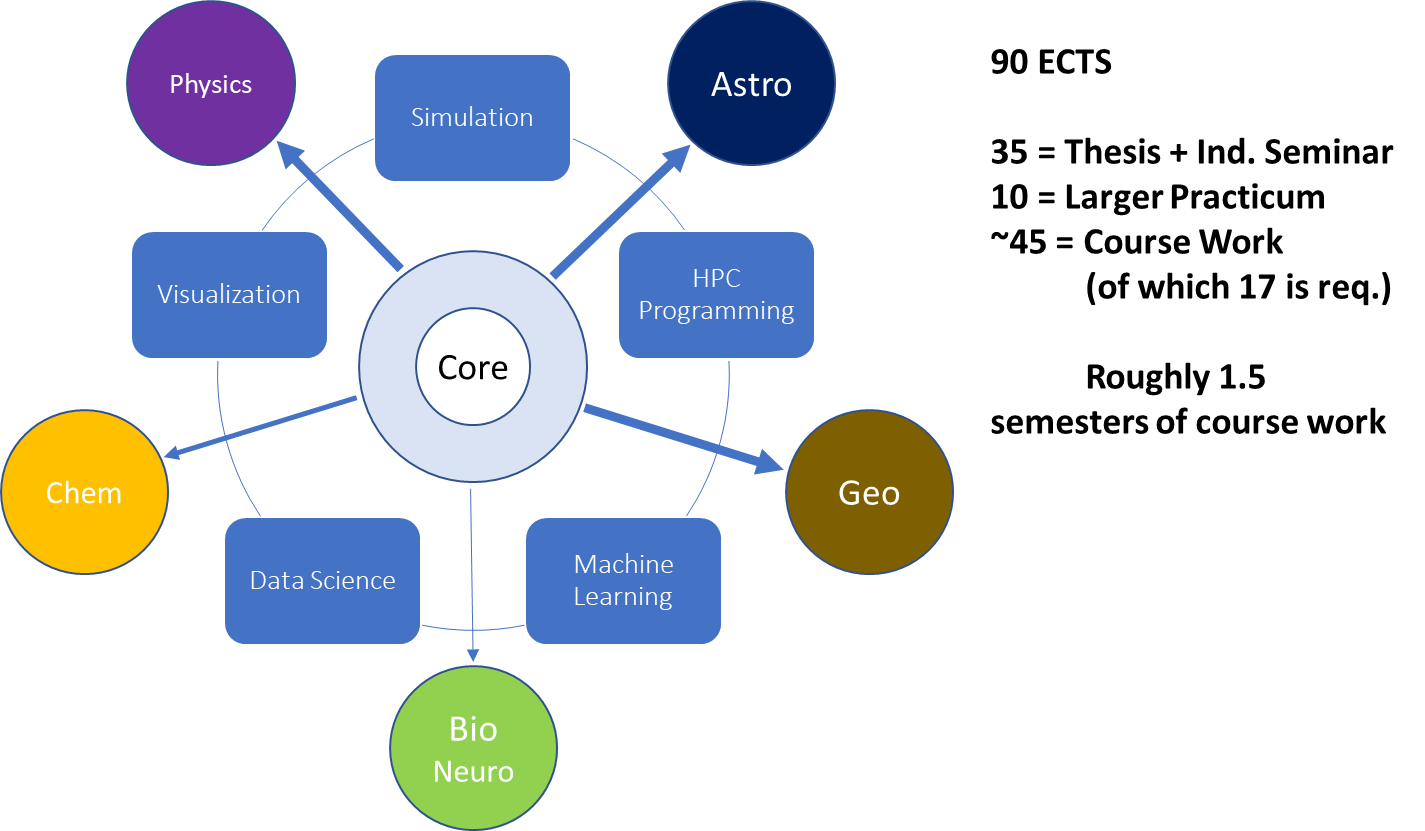Specialized Master in Computational Science

Information
The specialized mono/major Master's study program Computational Science (90 ECTS credits) started in fall semester 2021.
The ever increasing power of computers has made calculations that were unthinkable a decade ago tractable today. The level of complexity of scientific questions and industrial modelling that need to be tackled are met by an increasing realism that is achievable by modern computers and novel computational methods. These skills can now truly be considered as part of the technical foundation of scientists along with calculus and traditional computer science. There is a great need in science and in industry for people with competence in simulation methods, high performance computing, machine learning and data science, in short the skills of a modern computational scientist. We offer an exciting 90 ECTS Master program to prepare a new generation of such knowledge engineers.
*** The ICS does not compensate foreign or local MSc students ***
Program structure
The Specialized Master in Computational Science has a core that focuses on general principles (Methodological Foundations, Numerical Methods for Differential Equations in Simulations, Advanced High-performance Computing, Methods for Visualizing Simulation Data, Machine Learning in Science). The core courses all have a strong practical component in code development and programming. In addition, there are electives with a focus on the hands-on aspect. Possible directions include Computational Physics and Astrophysics, Computational Chemistry, Computer Graphics, Applications in Earth and Environmental Sciences.
In outline, the program is (modules in green take place in the spring semester):
| Compulsory Modules | ECTS credit points | |
| ESC203 Advanced Simulations in the Natural Sciences | 5 | |
| ESC412 Advanced High Performance Computing (note below) | 5 | |
| PHY371 Machine Learning for the Sciences | 5 | |
| ESC406 Computational Thinking II | 2 | |
| ESC413 Computational Thinking I | 2 | |
| ESC411 Individual seminar work on given topic | 5 | |
| Master thesis | 30 | |
| Elective Modules | ECTS credit points | |
| ESC414 Practicum in Advanced Simulation Science | 10 | |
| ESC204 Computational Methods for Radiative Transfer | 5 | |
| ESC405 Big Data for Natural Sciences | 3 | |
| AST245 or AST246 Computational Astrophysics | 6 or 10 | |
| PHY522 Computational Quantum Physics | 8 | |
| INI427 Models of Computation | 6 | |
| GEO442 Remote Sensing: Spectroscopy of the Earth System | 6 | |
| CHE 747 Quantum Chemistry | 2 | |
| CHE437 Surface and Interface Science | 4 | |
| ESC802 Academia Industry Modelling (AIM) week | 2 | |
| GEO877 Spatial Algorithms | 3 | |
| MINFS520 Advanced software engineering | 3 | |
| (MINF4557 Advanced computer graphics) | 6 | |
| BMINF002 Computer Graphics | 3 | |
| Numerical Methods for Hyperbolic Partial Differential Equations (spring '22 at ETHZ: 401-3652-00 , spring '23 at UZH: MAT827, etc.) | 10 | |
| irregular (takes place in fall 2022) MAT933 Complex Networks Theory and Applications | 6 | |
| irregular: MAT837 Very high order methods for hyperbolic problems | 6 |
Admission requirements
Admission to the specialized Master's program is by application.
The specialized mono/major study program Computational Science (note: not Computer Science) at Master's level requires a major in one of the MNF study programs:
Physics
Astronomy/Astrophysics
Chemistry
Geography
Math
Biology/Neurosciences
with a minor in:
Computer Science
Statistics
Math
Data Science
A strong computer programming background and interest are the prerequisites for applying. Please note that having 1st year introductory courses in the natural sciences (listed above) is not considered sufficient.
In certain cases, students will be required to additionally take courses to fulfil the entry requirements. A list of such courses (with ECTS credit points) are given below:
| ESC 201 Simulations in the Natural Sciences I | 5 |
| ESC 202 Simulations in the Natural Sciences II | 5 |
| ESC 403 Introduction to Data Science | 6 |
| AINF 02 (AINF 1166) Informatik I | 6 |
| BIO 134 Programming in Biology1 | 5 |
| AINF 06 (AINF 1169) Informatik II | 6 |
| ESC 401 High Performance Computing | 6 |
| STA 402 Likelihood Inference | 5 |
| STA 110 Introduction to Probability | 5 |
| STA 120 Introduction to Statistics** | 5 |
For BIO Majors:
| BIO 390 Introduction to Bioinformatics | 3 |
For Neuroinformatics Majors:
| INI 401 Introduction to Neuroinformatics | 6 |
| MAT 141 Lineare Algebra für die Naturwissenschaften | 5 |
| AINF 1170 Formale Grundlagen der Informatik I | 6 |
For Astronomy/Astrophysics Majors:
| AST 512 Theoretical Astrophysics | 10 |